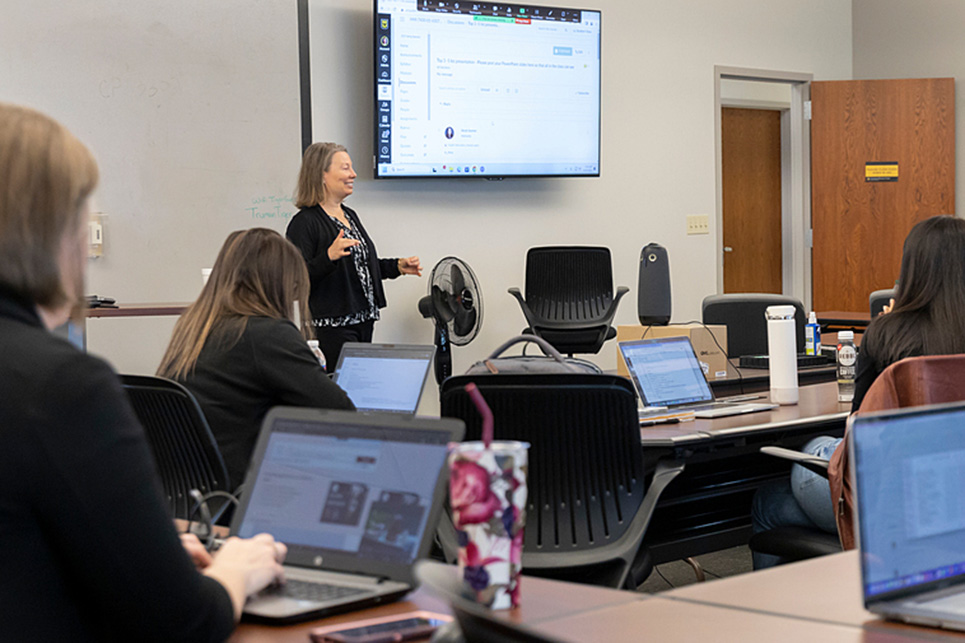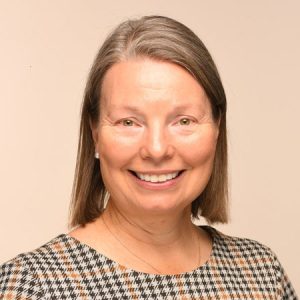Oct. 11, 2024

Story by Cheri Ghan, ghanc@health.missouri.edu
What do the chief information officer of MU Health Care and a program analyst with the St. Louis VA Health Care System have in common? They both came through the University of Missouri’s Executive Master of Health Administration program in the three decades since its inception.
In the mid-90s, two growing priorities at the University of Missouri converged to breathe life into the Executive MHA program.
On one front, Mizzou was interested in diving deeper into distance learning education. Simultaneously, the leaders of the university’s successful residential Master of Health Administration program wanted to create a pathway for people already engaged in meaningful health care careers to complete a master’s degree while continuing to work.
Call it a serendipitous coincidence.
When the university offered support to its graduate programs wanting to try something new, the Executive MHA program was born. The first cohort started in January 1994 and graduated in December 1995.
Thirty years and nearly 500 graduates later, the Executive MHA program has become a foundation for excellence in health care career development and advancement.
Committed to quality
From the outset, program creator Dr. David Oliver adopted a “service quality” approach. Current MHA program director Sue Boren, MHA ’93, Ph.D. ’04, was a faculty member in the residential program at that time and remembers Oliver’s enthusiasm for students.
“His advice to me from day one was always to focus on the quality of the student’s experience in the program, to get to know each person well, and understand their needs and aspirations,” Boren said. “His passion for delivering a quality experience was infectious to anyone who worked with him. To this day, our goal is to deliver a program that, were Dr. Oliver still with us, he would regard as living up to that original standard.”
The quality experience students enjoy is a hybrid two-year program of asynchronous online classwork combined with four weekends of in-person sessions on campus each semester. Students of all ages come from a wide variety of health care careers: administrative careers and clinical fields such as medicine, nursing, and various allied health professions.
The Executive MHA program coursework covers various aspects of the U.S. health care system, health informatics, health care economics, policy, law and research. The goal is to prepare graduates for executive leadership positions at multiple levels.
“Our MHA curriculum is defined by the intersection of the health care world and the business/administration world,” said MHA Associate Director David Moxley, BA ’93, MLIS ’95. “Health care is unique among industries, yet is similar, if not the same, in countless ways. Our curriculum interweaves these worlds for our students, from focusing on research in both spheres to creating a faculty composed of traditional academics and experienced health care practitioners and leaders.”
Ready for anything
In the mid-‘90s, Debra Dow was working as a patient service representative for various MU Health Care clinics. Dow knew many of the management staff she worked with had graduated from Mizzou’s residential MHA program.
Dow had several years of experience working in health care, but she wanted that master’s-level education. While a family that included two children meant the residential program was not in the cards, the relatively new Executive MHA and its flexible schedule was a perfect way to get the advanced education she craved.
“My experience in the program was outstanding,” said Dow, who graduated from the Executive MHA program in 1999 and now serves as the chief information officer for MU Health Care. “The faculty were exceptional, and the curriculum focused on areas relevant for my career development. The schedule and classes were demanding, but I was able to balance these with my professional and personal commitments.”
While it’s a logical educational progression for professionals with an undergraduate degree and experience in the business side of health care, the Executive MHA also became a pathway for clinical professionals who wanted to expand their career options. Boren said the program succeeds by providing those individuals with the organizational leadership knowledge and skills their clinical training likely did not offer.
One clinician who wanted to develop administrative leadership skills through the Mizzou program was Derek Helderman, MHA ‘22.
Helderman is currently a program analyst and acting service chief for the Technology, Innovation, and Development Service at the St. Louis VA Health Care System. But when he enrolled in the Executive MHA program, he was working for the VA as a registered dietician in an administrative nutrition and food-service role.
Helderman wanted to broaden his knowledge, and he appreciated how the program melded the world of health care with a rigorous business and management education. He was particularly excited by the hybrid approach that blended online and on-campus learning.
“I really wanted the experience of being uncomfortable — in the best way possible — by being in person and being forced to get out of my comfort zone,” Helderman said. “Distance learning is great, but those connections you form by being face to face are invaluable. Those connections are truly the best and most important parts of any higher-education journey.”
In addition to collaborating with his classmates, Helderman also benefited from the Executive MHA mentorship program. He was paired with 2010 MHA graduate Andrea Wiggins, assistant director of the Harry S. Truman Memorial Veterans’ Hospital in Columbia. Wiggins met monthly with Helderman, and he was able to spend an entire day shadowing her in Columbia.
“I would encourage anyone completing the MHA program to take the mentorship experience seriously,” he said. “It can be an enormously beneficial learning experience if you are serious about connecting with your mentor.”
Changing with the times
While the ever-changing world of health care presents unique challenges, Moxley said the amazing students who came through the Executive MHA program have kept it relevant over the past three decades.
“Health care leadership is never boring and ever-changing,” Moxley said. “Faculty members, including myself, eagerly anticipate learning from our Executive students each semester. These professionals bring real-world insights from the frontline of health care, enriching understanding and teaching. Preparing leaders for today’s challenges and the unimaginable ones that they will face in the future is what we do.”
Dow said anyone looking to gain the education necessary to grow in health care leadership should consider the Executive MHA program.
“Health care is changing faster than any of us can keep up with in isolation,” Dow said. “The degree not only assists in understanding contemporary health care but also helped me develop a network of fellow professionals that enable me to be effective in the face of rapid change.”

